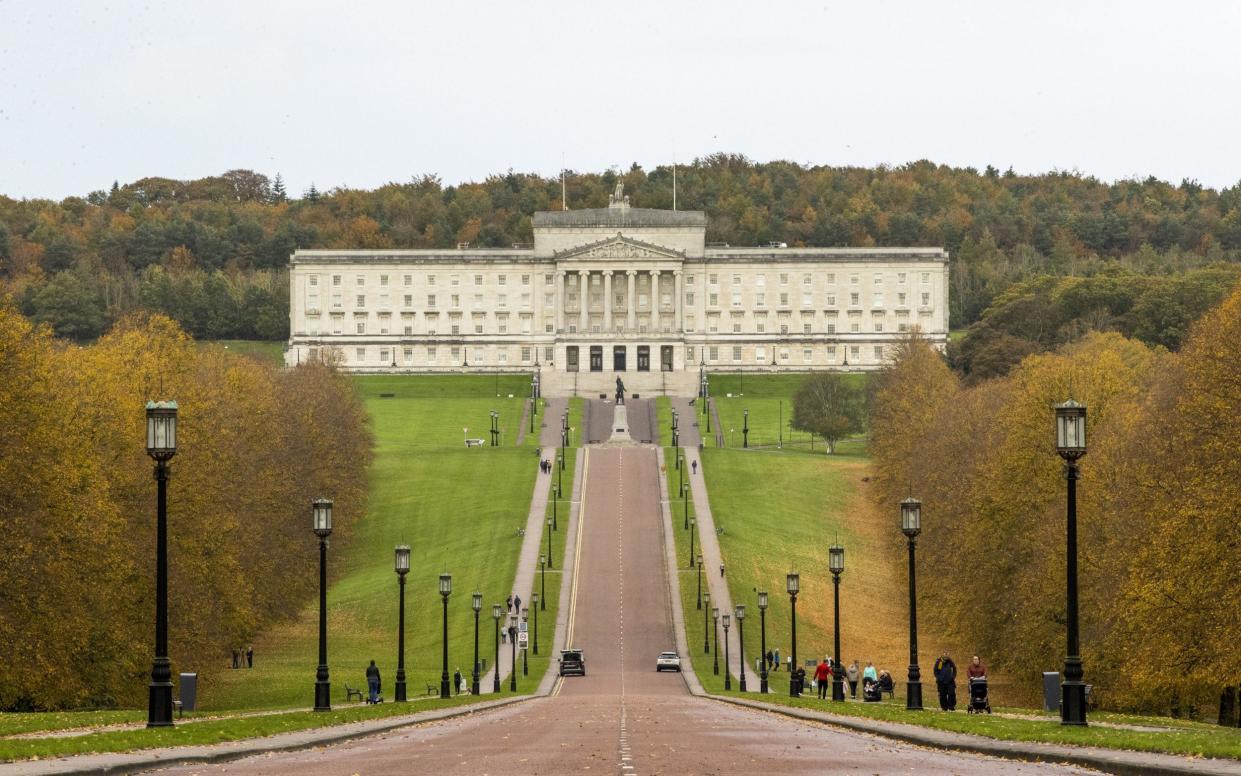The Government must stand against Republican attempts to rehabilitate terrorism

“He who controls the past controls the future”, commented George Orwell. Nowhere is this truer than in Northern Ireland – and the success of Sinn Fein in doing so has brought them extraordinary dividends both in Ulster and in the Republic where they have been at a historic high in the polls.
Central to this is the attempt to redefine the Troubles as a necessary and even as a justifiable terror campaign. Michelle O’Neill, the leader of Sinn Fein in Northern Ireland, stated last year that there was no alternative to the IRA’s actions. Subsequent polling for the Belfast Telegraph showed that 69 per cent of those in the nationalist and republican community believed that “violent resistance to British rule during the Troubles” was the only option, with just 25 per cent disagreeing.
These figures represent a triumph of historical reinvention. Sinn Fein has invested considerable effort in challenging the conventional memory of the Troubles – seeking to undermine both their nationalist opponents and unionists, and to achieve the status of a legitimate national movement. They have been surprisingly successful, in large part because mainstream nationalism, much of unionism and certainly the UK Government have been muted in their response.
Unlike nationalist Ireland, we have forgotten the importance of history. We have been persuaded that the Troubles were an Irish matter, not a UK one, even though 99.75 per cent of those killed died on UK soil and most of those who died identified as British. This should be no surprise: it was, after all, a war against “the Brits”.
We need to rediscover our history. Without it we lose our bearings, and our political soul is hollowed out. There is now a golden opportunity to do this. The Government has set out its intention to commission an official history of the Troubles. Such an initiative is right in and of itself and the 25th anniversary of the Belfast Agreement seems an appropriate point for such an initiative. It is all the more important when the conflict that once raged in real time is now being fought over the history of the Troubles.
Though the Government clearly regards a public history as playing an important role in addressing the legacy of Northern Ireland’s past, there is no mention of it in the Northern Ireland Troubles (Legacy and Reconciliation) Bill, currently making its way through the House of Lords. No doubt the Government has its reasons: legislation is not required to commission an official history and it could in theory be managed through the Cabinet Office’s Official History Programme.
However, this programme is not sufficiently resourced to produce an official history on the Troubles. The topic is vast in terms of the timescales covered and the amount of documentation that needs to be assessed. It also comprises a great range of actors. These include politicians and civil servants in Belfast and London as well as the intelligence services, police and the military. A project of this scale requires a number of leading historians with adequate research support, well beyond the Official History Programme’s budget.
The Government intends that the official history should provide support to the other academic research programmes proposed in the Bill, but these research programmes are intended to be concluded within seven years. So, in practice, the official history is unlikely to be published in time to do so if it is run through the Cabinet Office.
This, in turn, raises risks. It is one thing to allow for a programme of Memorialisation of the Troubles (as the Bill puts it) that is open to being informed by a range of different perspectives and reminiscences; it is another to allow it to so lose its bearings from the facts such that it becomes a tool for anti-state activists.
And we should be under no illusions.Those activists will work actively to get their version of the Troubles set out – and to prevent any pushback that gives voice to the the vast majority of the population who opposed violence. Oral history, decoupled from documentary evidence, could work very well for such community groups and their allies.
We cannot afford for that to happen and we cannot afford to assume that it won’t, for experience, sadly, points just one way. To have any hope of avoiding such an outcome requires an authoritative history produced in good time to act as a gold standard in the field. To adapt Michael Ignatieff’s words on the Balkan conflicts, we need to reduce the number of permissible lies about the past.
Communicating a thoroughly informed official history to the public, and ensuring it is affordable and available for all who want to read it, will do more than anything else to ensure a successful roll back of the anti-state and republican strategy of delegitimising the authorities of this country.
That is why I am putting forward an amendment to the Legacy Bill tomorrow to ensure that an authoritative public history is commissioned, resourced and produced in good time to ensure that the legacy and reconciliation that is needed in Northern Ireland has its foundations in fact and not in fiction.
This is a matter that is of equal concern in Ireland, where just recently the Irish women’s national football team felt it was fine to sing a pro-IRA song (“Ooh, ah, up the 'Ra”) after winning a qualifier against Scotland in October last year. An authoritative history of the Troubles would help rescue our shared history and ensure that paramilitary-friendly narratives do not enjoy pride of place in our national memories.
Dean Godson is Director of Policy Exchange. He is a member of the House of Lords and sits on the Protocol on Ireland/Northern Ireland sub-committee. He is the author of Himself Alone: David Trimble and the ordeal of Unionism

